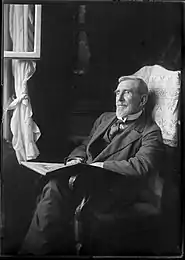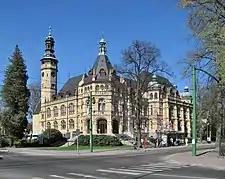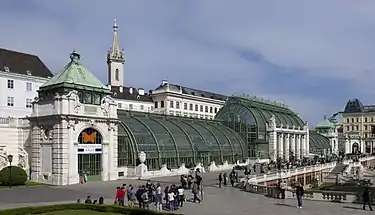Friedrich Ohmann
Friedrich Ohmann (21 December 1858, Lemberg - 6 April 1927, Vienna) was an Austrian architect in the Historicist style.

Life and work

His father was a building official. In 1877, he began his studies in architecture at the Technical University in Vienna. His professors there included Heinrich von Ferstel and Karl König]. In order to gain more creative training, he enrolled at the Academy of Fine Arts and studied with Friedrich von Schmidt.
From 1889 to 1899, he was a Professor of decorative architecture at the Academy of Arts, Architecture and Design in Prague, and was involved in several restoration projects. In 1898, together with Josef Hackhofer, he created designs for all the bridges and their associated structures on the Wien River, then returned to Vienna to oversee the construction.
He served as the artistic director for the Neue Hofburg from 1899 to 1907. His projects included the Palmenhaus, a greenhouse near the Burggarten, and the monument to Empress Elisabeth of Austria, in the Volksgarten, with a statue by Hans Bitterlich.
From 1904, he was the head of the master class for architecture at the Fine Arts Academy.
Early in 1918, he presented the first drafts for a large monument dedicated to Emperor Franz Joseph I, which he thought would be a logical addition to the Votivkirhe, but the project was never pursued after the war.[1]
He was given an Ehrengrab ("honorary grave") by the City of Vienna. A street in Vienna's Döbling district is named after him.
References

Further reading
- Reinhard Pühringer: Friedrich Ohmann (1858–1927), Protagonist des »genius loci«, zu Tradition und Aufbruch vom Frühwerk bis zu den Wiener Großprojekten (1884–1906/07). Dissertation from the Institute for Art History, University of Vienna, 2002.
- Reinhard Pühringer (1999), "Ohmann, Friedrich", Neue Deutsche Biographie (in German), vol. 19, Berlin: Duncker & Humblot, pp. 492–493; (full text online)
- R. Schachel: "Ohmann Friedrich". In: Österreichisches Biographisches Lexikon 1815–1950 (ÖBL). Vol. 7, Austrian Academy of Sciences, Vienna 1978, ISBN 3-7001-0187-2, p. 220.
- Felix Czeike (Ed.): Historisches Lexikon Wien, Vol.4, Kremayr & Scheriau, 1995 ISBN 3-218-00546-9 (Online)
External links
- Literature by and about Friedrich Ohmann in the German National Library catalogue
- Friedrich Ohmann in Austria-Forum (in German) (at AEIOU)
- "Friedrich Ohmann – ein Architekt zwischen den Disziplinen". ERSTE Foundation.
- Friedrich Ohmann. In: Architektenlexikon Wien 1770–1945. Published by the Vienna Architecture Centre. Vienna 2007.